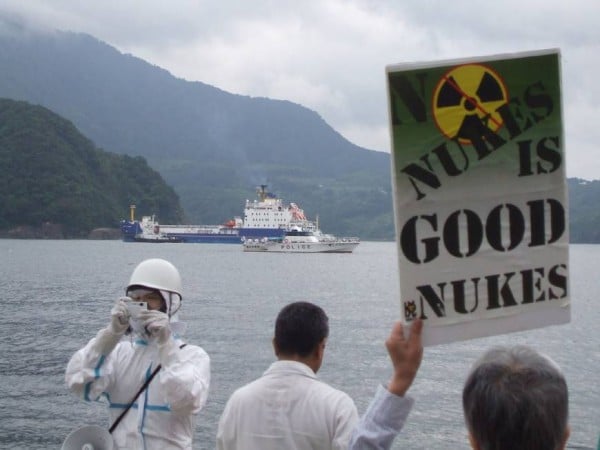
Protesters demonstrate against first post-3/11 shipment of MOX fuel to Japan. (Eric Johnston)
Dozens of protesters from all over Japan turned up for the arrival of a shipment of mixed uranium-plutonium (MOX) at the port of Takahama in Fukui Prefecture after its two-month journey from France. According to a Japan Times article, this was the first shipment of MOX fuel since the March 11, 2011, quake/tsunami-triggered nuclear crisis in Fukushima.
The fuel was destined for reactor 3 of Kansai Electric Power Co.’s Takahama nuclear power plant. However, the fuel is likely to sit in storage as Tokyo has yet to approve the restart of reactors 3 and 4. Kepco will seek the central government’s approval after new safety standards go into effect next month.
Antinuclear groups presented petitions to Kepco officials questioning the rationale for importing MOX fuel.
“For the utilities, the costs of manufacturing, transporting, burning, and then disposing spent MOX fuel are many times greater than the costs of using conventional uranium. In the extreme economic conditions of recent years, we question this method at a time when we’re told electricity costs will rise,” one petition from four major Japanese antinuclear groups said.
Fukui Governor Issei Nishikawa, who is pronuclear and will have the final say on whether the reactors will be restarted after Tokyo’s approval, said applying to restart the reactors and loading reactor 3 with MOX are separate issues.
The last of Japan’s 50 reactors went offline May 5, 2012. Despite 80 percent of the Japanese population being distrustful of nuclear power according to the Christian Science Monitor, unit 3 of Oi Nuclear Power Plant went back online July 1, 2012, and unit 4 went online in September.
The use of nuclear power has always presented a dilemma for Japan, the only country to have been attacked with nuclear weapons. On one hand, nuclear power is the only viable solution for energy independence for a country that has few natural resources. Japan learned the hard way what dependence on foreign energy meant in World War II, when the U.S. effectively cut off all energy shipments to its enemy. On the other hand, as an earthquake-prone country, Japan is not geographically ideal for nuclear power plants. If the disaster in Fukushima taught Tokyo nothing else, it’s that Japan was clearly ill-equipped to handle nuclear power. It will take three to four decades to decommission the nuclear power plant in Fukushima.